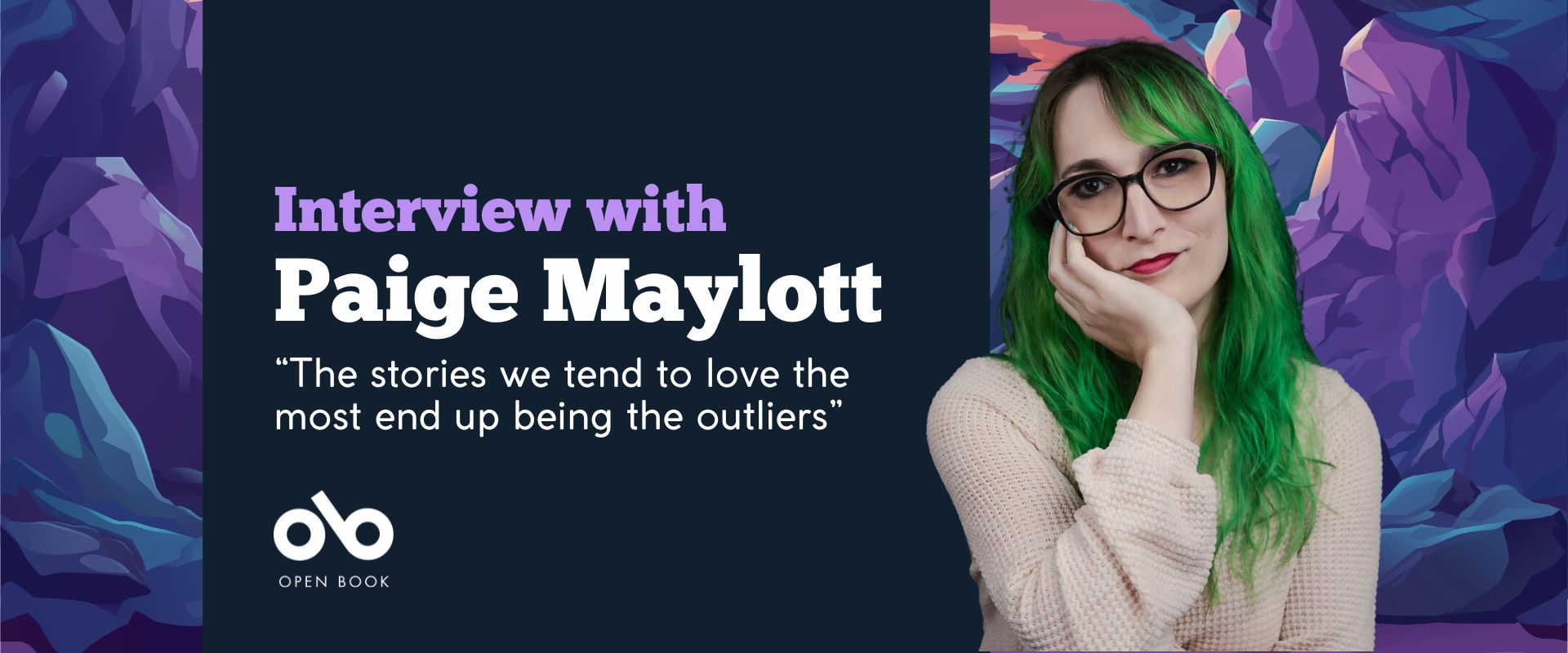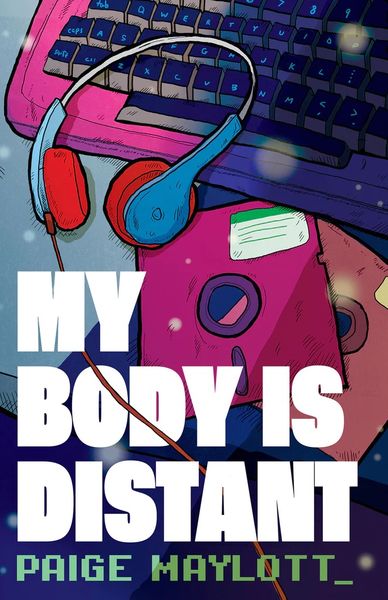"Memory is a Slippery and Selective Thing" Paige Maylott on Gaming, Writing, & Finding Herself
What is a body in a virtual world? As we move more and more of our socializing, working, and identities online, where does that leave our understanding of our physical selves, in terms of gender, sexuality, health, and more? These are some of the questions Paige Maylott grapples with in My Body is Distant (ECW Press) and the result is an intimate, fascinating deep dive into bodies and belonging.
Maylott describes her journeys, online and off, from virtual BDSM clubs and battlefields to facing down a cancer diagnosis and navigating the process of gender affirmation. With her health, marriage, and work in crisis, Maylott discovers her grit and power translates from the virtual world to the physical one, but the process is anything but simple. Timely and compelling, Maylott's storytelling is engrossing, authentic, and inspiring. A perfect read for gamers and non-gamers alike, it's a memoir that should not be missed.
Today we're speaking with Maylott about the memoir, which began as a graduate thesis. She tells us about carving out a writing nook in a busy home, explains how she combats the vulnerability of memoir writing with the reminder "the more I tell, the less I have to hide", and discusses how she's noted the growing enthusiasm for honest and authentic creative nonfiction.
Open Book:
How did your memoir project first start? Why was this the right time to tell your story?
Paige Maylott:
My Body is Distant started as a graduate level thesis project back in 2017-18. It began as the creative portion of a mixed creative/scholarly examination of the intersections of gender transition and critical illness. Part-way through my degree I was forced to take a leave of absence because of a needed gender affirming surgery. The plus side is that the trip, and that surgery, became a pivotal part of the final memoir, but at the time that leave stretched my funding too far and I was forced to abandon my thesis, and my graduate studies, and that original draft got filed away.
It was probably for the best because I struggled with the effort of telling the heartfelt, intimate story I had in my mind while incorporating scholarly theory. I found the academic requirements too restrictive for the story I needed to tell, and I couldn’t envision a way around it. I don’t mind telling you that I ended up crying in my supervisor’s office more than once out of sheer frustration, unable to see a way around this dilemma.
I then took a job in the university library and tried to forget about the memoir. Over the next couple of years, I was so busy with work that I had almost forgotten about the memoir. However, when the COVID-19 pandemic struck, and we were all trapped in our homes, and my work slowed to a crawl, I realized that now was the time to dig out that draft and rewrite the whole thing in the way I always wanted to.
The realization of how to write the braided narrative structure of the memoir occurred to me, and armed with that framework, I wrote like a demon. I wrote after work and late into the night, and it encompassed every free moment I had until several months later I held the first draft.
OB:
What do you need in order to write – in terms of space, food, rituals, writing instruments?
PM:
At first, I tried writing on the couch with headphones next to my partner, but I quickly realized that wasn’t going to work for me, both because of the intimate nature of the subjects I was writing about, and partly because I was distracted by the television.
Your CanLit News
Subscribe to Open Book’s newsletter to get local book events, literary content, writing tips, and more in your inbox
I ended up cleaning out a spare bedroom on the second floor of the house we rented, and over the span of a few days I awkwardly dragged dressers and chairs, and everything extraneous out of the room and down into the basement. I went to IKEA and bought one carpet, one chair, a shelf, and one side table for my tea. I also bought a hook lock for the door because it has a faulty latch.
When I would write, I fixed myself a cup of tea (with a small splash of milk and no sugar, I’m sweet enough, thank you very much), and then I would tell my partner I’m disappearing to write. I would then lock the door, put on my headphones, and be as completely alone with my thoughts as is possible for someone sharing a home with another person and four animals.
OB:
Did you use any materials, documents, interviews, or other research that became part of the writing process?
PM:
Early in the writing process I came to realize that memory is a ‘slippery and selective thing’ as I mention in my introduction. I know that my recollections couldn’t entirely be trusted, and so I did my best, where I could, to confirm that my memories had some basis in truth.
For a lot of the earlier portions of the book I raided my family’s photo albums and tried to find evidence to corroborate my stories. Usually this turned into a teary nostalgia session and delayed my writing more than informed it, but it also helped to remind me of other useful events that could build upon the narratives I had already planned.
Since a lot of my anecdotes happen in online spaces, I also mined the archives of old email folders of chat logs from video games, and the digests Facebook used to send in emails filled with conversations from groups I used to belong to. These helped a lot to make sure that some of the online conversations were perfectly represented in the places I could.
Finally, during some of the more difficult moments of my early gender transition, I kept a private diary logging microaggressions at work, and how people treated me both in my family and in public. This helped ease my anxiety about misrepresenting people who may not be favourably represented in the narrative, even though I preserved their identities by changing their names.
OB:
Did you experience any anxiety about making a part of yourself public in this way? If so, how did you or do you cope with the vulnerability of publishing a memoir?
PM:
I have always suffered from being a bit of an over-sharer, but I think the exercise of writing a memoir opened that door wider. I am therefore pretty open about who I am, and the things I have done. My thinking is that the more I tell, the less I have to hide, and the less that other people can use against me. In a sense, though I’m not particularly religious, the old Bible passage ‘the truth will set you free’ really rings true for me, and I hope that’s how future Paige will see it too once the memoir goes public.
However, this isn’t just any old memoir, this is a memoir about a trans woman. In today’s political climate, I am conscious of all the different groups who might attempt to weaponize my words against me and the trans community. To that, all I can say is that this is just my story, and my perception of the events I have related in my book. I am quite aware that others will see things differently, and all I can hope for is that people are gracious.
OB:
Personal essays, memoirs, and creative nonfiction in general have becoming particularly in demand and loved by readers in recent years. Why do you think creative nonfiction is more popular than ever?
PM:
It’s interesting to me to hear that memoir and CNF are growing in popularity, but it’s not surprising. If I had to guess why that is, I would probably look at the way we currently consume media, and how our lives are increasingly incorporating AI resources like ChatGPT.
Many of the television shows, the movies, and even the books we read all conform to tried and true formulaic methods with heroic arcs and data-driven profit margins approved by massive production companies who curate the digital archives which tell you what is available for you to watch. It’s not surprising to me that the stories we tend to love the most end up being the outliers, and the ones with surprising, unconventional endings and twists, and ones we know are based not in what corporation thinks we want, but fantastic and surprising stories about real lives.
And as far as AI goes, we’re now living in a world where it’s increasingly difficult to tell a human-written narrative from one either assisted by, or fully written by artificial intelligence. Is it then surprising to me that someone would want the reassurance that the story they’re picking up, like my memoir, is guaranteed to be something unique? I don’t find that hard to believe at all.
_____________________________________________________
Paige Maylott is a writer, gamer, and explorer of virtual worlds based in Hamilton, Ontario. She is a 2021 Hamilton Arts & Letters Award winner for Creative Non-Fiction, and a recipient of the 2022 Canada Council for the Arts grant.






